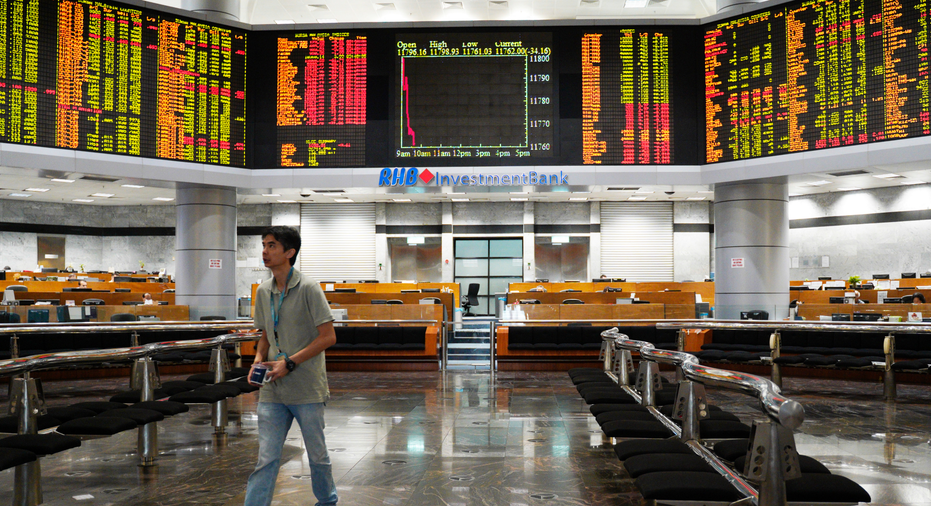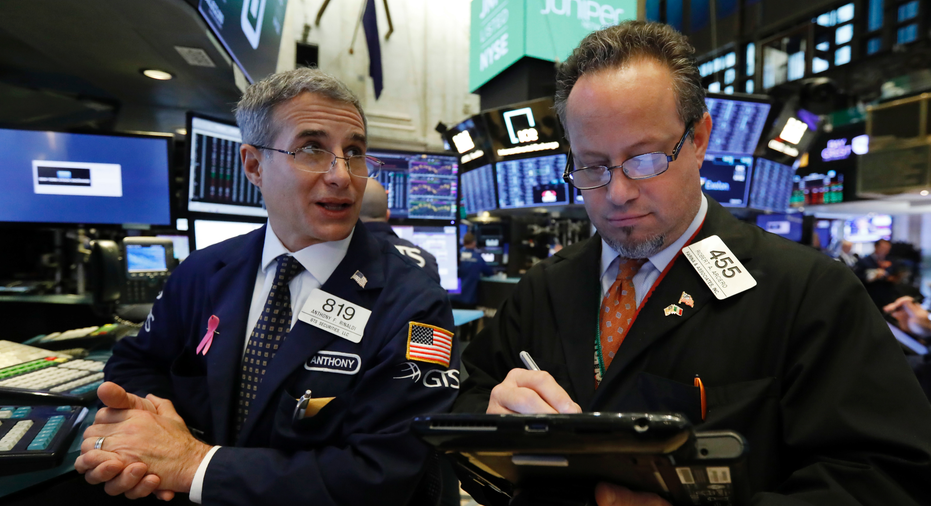S&P 500 slides into 'correction' for second time this year
An Investor walks in front of private stock trading boards at a private stock market gallery in Kuala Lumpur, Malaysia, Friday, Nov. 23, 2018. Asian markets are mostly lower as traders dwelled on risks from a drawn-out dispute between the U.S. and China and other events closer to home. (AP Photo/Yam G-Jun)
U.S. stocks closed lower after a shortened session Friday, bumping the benchmark S&P 500 index into a correction, or drop of 10 percent below its most recent all-time high in September.
Energy companies led the market slide as the price of U.S. crude oil tumbled to its lowest level in more than a year, reflecting worries among traders that a slowing global economy could hurt demand for oil.
"Oil is really falling sharply, continuing its downward descent, and that appears to be giving investors a lot of concern that there's slowing global growth," said Jeff Kravetz, regional investment director at U.S. Bank Private Wealth Management. "You have that, and then you have the recent sell-off in tech and in retail, and then throw on there trade tensions and rising rates."
Losses in technology and internet companies and banks outweighed gains in health care and household goods stocks. Several big retailers declined as investors monitored Black Friday for signs of a strong holiday shopping season.
Trading volume was lighter than usual with the markets open for only a half day after the Thanksgiving holiday.
The S&P 500 index fell 17.37 points, or 0.7 percent, to 2,632.56. The index is now down 10.2 percent from its last all-time high set Sept. 20. The last time the index entered a correction was in February.
The latest correction comes as investors worry that corporate profits, a key driver of stock market gains, could weaken next year.
"The market is re-pricing and trying to assess where we're going to be in the early part of 2019," said Quincy Krosby, chief market strategist at Prudential Financial.
The Dow Jones Industrial Average lost 178.74 points, or 0.7 percent, to 24,285.95. The Nasdaq composite dropped 33.27 points, or 0.5 percent, to 6,938.98. The Russell 2000 index of smaller-company stocks picked up 0.40 points, or 0.03 percent, to 1,488.68.
Crude oil prices fell for the seventh straight week on worries that a slowing global economy could hurt demand even as oil production has been increasing.
The benchmark U.S. crude contract slid 7.7 percent to settle at $50.42 per barrel in New York. That is the lowest since October 2017. Brent crude, the international standard, lost 6.1 percent to close at $58.80 per barrel in London.
Saudi Arabia and other OPEC members have recently signaled a willingness to consider production cuts at the oil cartel's meeting next month. The U.S. has been increasing pressure on Saudi Arabia and OPEC to not cut production, however, a move which could push prices down further.
The slide in oil prices weighed on energy stocks. Concho Resources, a developer and explorer of oil and natural gas properties, slumped 6.3 percent to $126.96.
Tesla fell 3.7 percent to $325.83 after the electric auto maker said it intends to cut prices for its Model X and Model S cars in China to make them more affordable.
Traders had their eye on retailers as Black Friday, the traditional start to the crucial holiday shopping season, began. Shares in L Brands, operator of Victoria's Secret and Bath & Body Works, added 2 percent to $29.97. Other retailers put investors in a selling mood. Kohl's fell 3.7 percent to $63.83, while Target lost 2.8 percent to $67.35. Macy's dropped 1.8 percent to $32.01.
Rockwell Collins climbed 9.2 percent to $141.63 after Chinese regulators conditionally approved the sale of the maker of communications and aviation electronics systems to United Technologies Corp.
Investors will be watching next week when Presidents Xi Jinping and Trump meet at the Group of 20 summit in Argentina for signs that the two leaders can find common ground to begin unwinding the spiraling trade dispute.
The dispute between the U.S. and China has weighed on the market, stoking traders' worries that billions in escalating tariffs imposed by both countries on each other's goods will hurt corporate earnings at a time when the global economy appears to be slowing.
"If you can get President Trump and President Xi to even just come closer with their rhetoric and make a bit of progress on the trade front that could be the catalyst for markets to move higher," Kravetz said.
It may take more than a meeting to work out deep-seated issues between Washington and Beijing, which resumed talks over their trade dispute earlier this month. According to The Wall Street Journal, the U.S. has asked its allies to stop using telecommunications equipment from Huawei, which is Chinese-owned. The report cited people familiar with the matter.
Bond prices fell Friday. The yield on the 10-year Treasury note rose to 3.05 percent from 3.04 percent late Wednesday.
The dollar fell to 112.88 yen from 112.97 yen late Thursday. The euro weakened to $1.1330 from $1.1406. The pound eased to $1.2810 from $1.2876.
Gold declined 0.4 percent to $1,223.20 an ounce. Silver dropped 1.8 percent to $14.24 an ounce. Copper slid 1 percent to $2.77 a pound.
In other commodities trading, wholesale gasoline plunged 7.9 percent to $1.39 a gallon. Heating oil lost 4.8 percent to $1.88 a gallon. Natural gas fell 3.2 percent to $4.31 per 1,000 cubic feet.
Major indexes in Europe finished mostly higher after shaking off an early slide.
Traders were weighing the latest developments in the negotiations for Britain's exit from the European Union. Both sides were finalizing the terms of the divorce Friday and expected to sign off on the deal Sunday, though it's unclear whether the British parliament will pass the deal.
The FTSE 100 index of leading British shares slipped 0.1 percent. Germany's DAX index rose 0.5 percent, while France's CAC 40 gained 0.2 percent.
Earlier in Asia, South Korea's Kospi shed 0.6 percent and Hong Kong's Hang Seng index dropped 0.4 percent. Australia's S&P/ASX 200 bucked the trend, gaining 0.4 percent. Shares fell in Taiwan and rose in Singapore, Thailand and Indonesia. Japanese markets were closed for a holiday.





















